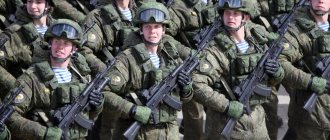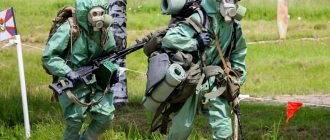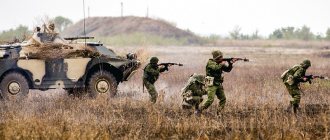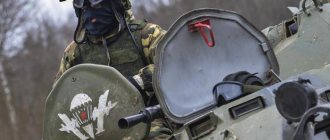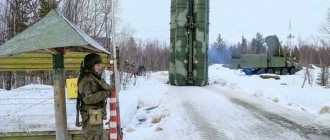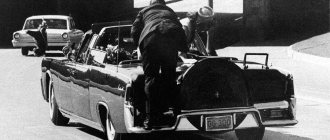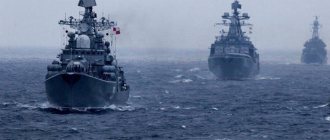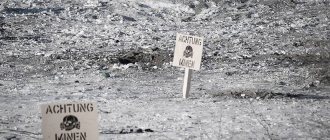Military security
The military doctrine of the Russian Federation defines the concept of “Military security of the Russian Federation” as “the state of protection of the vital interests of the individual, society and state from external and internal military threats associated with the use of military force or the threat of its use, characterized by the absence of a military threat or the ability to resist it” ; in this case, “military danger” is understood as a state of interstate or intrastate relations, characterized by a set of factors that can, under certain conditions, lead to the emergence of a military threat (a state of interstate or intrastate relations, characterized by the possibility of a military conflict between opposing parties).
Military security is determined by the readiness and ability of a state to protect its interests and sovereignty, to resist military aggression and any other forms of external pressure, including military violence or blackmail from a position of force, as well as to suppress attempts to start a civil war, ethnic conflicts using violence or terrorism activities.
In the military security system, the following are important:
* intelligence, primarily military intelligence, but not only, the main task of which is to carry out a set of measures to obtain and process data about the current or potential enemy, its military resources, combat capabilities and vulnerabilities, as well as about the current or probable theater of military operations;
* counterintelligence, the task of which is to suppress the intelligence activities of the relevant bodies of other states and anti-government, for example, extremist and terrorist organizations;
* border troops intended to protect the external borders of the state, as well as to maintain the appropriate regime in the border zone;
armed forces. The most important external factors in ensuring the military security of the state are:
* reducing (eliminating) military threats by political means,
* reducing the number of potential opponents and acquiring new allies, developing a system of measures to prevent and localize military conflicts,
* cooperation with neighboring states (including in anti-terrorism activities);
* participation in defensive military-political alliances to collectively repel possible aggression;
* participation in treaty processes on the reduction and limitation of weapons and armed forces; creation on a mutual basis of zones of reduced levels of weapons, demilitarized zones, nuclear safety zones and open airspace;
* restriction on a reciprocal basis of all types of military activities.
ntar (Appendix No. 7);
receive and transmit official telephone messages;
manage messengers;
stay in the headquarters premises at all times, maintain cleanliness and order in it, allow unauthorized persons into the headquarters premises in the manner established by the regiment commander;
immediately notify all military personnel at headquarters when an alarm is declared;
take service rooms under guard and store the keys to them;
monitor compliance with fire safety requirements at the regiment headquarters, and at the end of the working day, inspect the premises of the regiment headquarters in relation to fire safety;
receive official correspondence during non-working hours;
in the event of a fire, call the fire brigade, take measures to extinguish it, save documents and property of the headquarters, immediately report this to the regimental duty officer and the chief of staff of the regiment;
Upon arrival at the regimental headquarters, the chief of staff of the regiment and other deputy regiment commanders and senior commanders above them, as well as officers from a military unit other than their own, introduce themselves to them.
For example: “Comrade Major. The duty officer at the regimental headquarters is Sergeant Ivanov.”
Fire outfit
314. A fire squad is appointed from the regular (non-regular) fire brigade of the regiment consisting of: the squad leader, drivers (motormen) and numbers of combat crews according to the number of attached fire engines or other vehicles (motor pumps), guards according to the number of fire posts. The fire brigade reports to the regiment duty officer and the fire brigade chief.
315. The fire department is obliged to:
monitor compliance with fire safety requirements in the regiment;
check, together with the heads of storage facilities, warehouses and the park duty officer, before closing the facilities, the fulfillment of fire safety requirements and disconnection of electrical networks, and if these requirements are met, hand over fire badges to them;
If a fire occurs, report the location of the fire to the regiment duty officer and participate in extinguishing the fire using primary fire extinguishing agents.
The fire brigade performs its duties at the time established by the regiment commander. The head of the fire squad reports to the regiment duty officer at the time established by the post report card on the fulfillment of fire safety requirements in the regiment.
The relieved and incoming fire brigade chiefs report to the chief of the regiment's fire brigade and the regimental duty officer about the surrender and acceptance of duty.
The fire outfit is provided with the necessary fire extinguishing equipment, and military personnel serving as part of combat crews on fire trucks (motor pumps) are provided with jackets, trousers made of special fabric, belts and steel helmets.
Duty signaller-drummer
316. The duty signaller-drummer is appointed from trained soldiers of the units and reports to the regimental duty officer and his assistant. He must be in a room near the regimental duty officer's room and give signals on the orders of the regimental duty officer or his assistant.
To give signals in the absence of a signal-drummer, technical means of playing sound recordings can be used.
Chapter 7. Security of military service
General provisions
317. The safety of military service consists of maintaining in a regiment (unit) the conditions of military service and the procedure for its performance, ensuring the protection of personnel and each military serviceman individually, as well as the local population, their property and the environment from the influence of dangerous factors of military service arising in during the daily activities of the regiment (unit).
The general conditions for ensuring the security of military service in a regiment (unit) are:
maintaining military discipline;
ensuring a satisfactory moral, political and psychological state and health status of military personnel; (As amended by Decree of the President of the Russian Federation dated July 1, 2020 No. 440)
ensuring fire safety;
compliance with the internal rules determined by this Charter;
ensuring social protection of military personnel in accordance with the requirements of federal laws and other regulatory legal acts of the Russian Federation;
ensuring satisfactory sanitary and epidemiological condition of the regiment.
318. In order to ensure the safety of military service, by order of the regiment commander (Appendix No. 9), a permanent commission for the safety of military service is created, chaired by one of his deputies, which organizes the implementation of measures to ensure the safety of military service.
Responsibilities of the main officials of the regiment to ensure the security of military service
319. The regiment commander is responsible for the safety of military service in the regiment. In order to organize and constantly ensure the safety of military service, in addition to the duties of commanders (chiefs) set out in Articles 75 - 86 of this Charter, he is obliged to:
identify, analyze and predict dangerous factors in military service that pose a threat to military personnel, as well as the local population, their property and the environment when the regiment and its units carry out daily activities;
make a decision to ensure the safety of military service, which determines: measures to limit (neutralize) the dangerous factors of military service; security requirements when the regiment and its subunits carry out daily activities, taking into account the characteristics of the activities of personnel; a set of mandatory organizational and technical measures to ensure the safety of military service (Article 325 of this Charter);
set tasks for subordinate commanders (chiefs) to ensure the safety of military service, manage the work of the commission for the safety of military service;
carry out constant monitoring of compliance with military service security requirements during the daily activities of units (services);
determine in the regiment, on the basis of a standard list for the Armed Forces, a list of one-time (not related to the official duties of military personnel) work with increased danger and the procedure for their safe (accident-free) performance;
ensure the maintenance of weapons and military equipment, buildings, structures, equipment, as well as places where official and special duties are performed (workplaces) in a condition that meets the sanitary and safety requirements of military service; at least once every two years, organize certification in the regiment of places where military personnel perform official and special duties (workplaces) for their compliance with the conditions of military service in the manner determined by the Minister of Defense of the Russian Federation;
organize, in accordance with the garrison plan of interaction with territorial civil defense bodies, the participation of forces and assets of the regiment in the elimination of emergencies of a natural and man-made nature in the area of deployment, notification and, if necessary, evacuation of military personnel and members of their families, weapons, military equipment and other military property;
carry out the instructions of officials exercising control and supervision functions over compliance with federal laws and other regulatory legal acts of the Russian Federation on issues related to ensuring the safety of military service in the regiment;
organize an investigation of each fact of harm to the health of military personnel or a fact that entailed other grave consequences as a result of violation of the safety requirements of military service, and in the event of incidents and offenses related to the death of military personnel, their mass illness, injury to military personnel (wounds, injuries, concussions) with labor losses or damage to health (death) and property of the local population, the environment due to the fault of military personnel, personally participate in the investigation, bring the perpetrators to justice and take measures to eliminate violations of military service safety requirements; immediately notify the military prosecutor, the head of the military investigative body of the Investigative Committee of the Russian Federation, the military police, and take measures provided for by the legislation of the Russian Federation about incidents and offenses related to the death of military personnel, their mass illness, injury to military personnel; (As amended by Decree of the President of the Russian Federation dated March 25, 2015 No. 161)
comply with the procedure and deadlines for processing documents for the payment of insurance amounts and one-time benefits to military personnel and members of their families in cases provided for by the legislation of the Russian Federation.
320. Deputy regiment commanders, heads of military branches and services, unit commanders and their deputies, and other officials of the regiment (unit) are responsible for the safety of military service in subordinate units (services) in accordance with official, special duties and this chapter.
The specified officials who organize daily activities or manage their implementation (team leaders, senior or managers at the places of performance of official and special duties or at workplaces), directly when organizing and conducting each daily activity are obliged to:
clarify the dangerous factors of military service that may arise during the implementation of the event, and determine measures to limit (neutralize) them;
determine the procedure for organizing and carrying out activities of daily activities, appoint managers at the places where official and special duties are performed (at workplaces), performers and persons entrusted with monitoring their implementation;
ensure the creation of safe conditions for military service at each place of performance of official and special duties (at the workplace) and the supply of military personnel with the required means of individual and collective protection, therapeutic and prophylactic means;
Conduct personally (organize) classes to study safety requirements, including training personnel in safe techniques and methods of performing their official and special duties, as well as briefings;
Before carrying out daily activities, make sure personally that safe conditions have been created for this, that subordinates have mastered the safety requirements of military service communicated to them and have sufficient practical skills in their implementation, know the procedure for action in emergency situations and know how to provide assistance to victims;
to achieve compliance with the safety requirements of military service, to take measures to prevent death, injury (wounds, injuries, concussions), diseases of military personnel and civilians, and harm to the environment while monitoring their implementation; in case of detection of violations of safety requirements or in emergency situations, suspend the activities of daily activities, and hold persons who committed violations accountable in the prescribed manner;
ensure that, at the end of the daily activity, the place where it is performed (the workplace) is brought into order, as determined by the relevant manuals and instructions.
321. Each military personnel must strictly comply with the safety requirements of military service. For these purposes, he is obliged:
study safe methods and techniques for performing their official and special duties, be instructed in the safety requirements of military service, undergo internships at the place of performance of these duties, and also undergo testing of theoretical knowledge and practical skills to fulfill safety requirements;
correctly use personal and collective protective equipment, and, if necessary, be able to use therapeutic and prophylactic agents and provide first aid;
immediately report to your immediate commander (superior) about any situation that has arisen due to the fault of military personnel that threatens the life and health of military personnel, the life, health and property of the local population or harm to the environment, as well as about each fact of injury to him or other military personnel (wounds, injuries , concussion) when performing activities of daily living or about a deterioration in one’s health;
undergo medical examinations (examinations) in a timely manner.
Basic measures to ensure the safety of military service
322. The main measures taken in the regiment (unit) to prevent death, injuries (wounds, injuries, concussions) and reduce the incidence of military personnel are:
ensuring the psychological stability of personnel on the basis of maintaining a satisfactory moral, political and psychological situation in military groups, creating conditions for psychological compatibility and preventing violations of the statutory rules of relations between military personnel, preventing offenses; (As amended by Decree of the President of the Russian Federation dated July 1, 2020 No. 440)
regular training of personnel to carry out activities of daily activities, studying before carrying out the necessary safety requirements of military service;
control over compliance by personnel with military service safety requirements;
prevention of death and injury (wounds, injuries, concussions), primarily among military personnel serving in military positions associated with an increased danger to life and health (periodic testing of their theoretical knowledge and practical skills in first aid, compliance with the safety requirements of military service in the performance of official duties, mandatory medical examinations (examinations), including with the involvement of a psychiatrist, psychiatrist-narcologist); (As amended by Decree of the President of the Russian Federation dated 02/01/2021 No. 63)
carrying out sanitary and anti-epidemic (preventive) and other measures to protect the health of military personnel, provided for in Chapter 8 of this Charter;
maintaining high vigilance among personnel, ensuring strict compliance with the rules of daily duty duty, and other measures aimed at countering terrorism;
ensuring fire safety and rescue operations in accordance with Articles 327 - 334 of this Charter;
timely and full provision of the regiment with food, clothing, fuel and lubricants, components and materials for weapons and military equipment, other military property, resources and services provided;
household support for personnel (provision of barracks and housing facilities, trade and household services, bath and laundry services, water supply) in accordance with established standards;
interaction with state authorities of the constituent entities of the Russian Federation and local governments on the implementation of social guarantees and compensation established by the legislation of the Russian Federation for military personnel;
other measures to prevent harm to the life and health of military personnel, taking into account the specifics of their activities.
323. The main measures taken in the regiment to prevent harm to the life, health and property of the local population are:
taking measures to exclude the use of weapons and military equipment against the civilian population, individual civilians and civilian objects, developed in accordance with the requirements of federal laws, military regulations and relevant manuals and instructions;
placement of potentially dangerous military facilities of the regiment outside the sanitary protection zones of populated areas;
organizing interaction between the regiment command and local authorities in order to maintain friendly relations between military personnel and the local population;
informing the population about the restrictive measures established in the area where the regiment is deployed, agreed upon with local authorities.
324. The main measures for protecting the environment from threats arising during the daily activities of the regiment (unit) and for the rational use of natural resources are:
study of federal laws and other regulatory legal acts of the Russian Federation on environmental protection, environmental training and education of personnel;
prevention of environmental pollution in the area of deployment and in other places where daily activities of the regiment (unit) are carried out;
restoration of the environment contaminated during the daily activities of the regiment (unit), as well as in the event of accidents;
rational use of natural resources (introduction of resource-saving, waste-free and low-waste technologies, land reclamation, rational use of water resources, etc.).
When developing and implementing these activities, the requirements of the legislation of the Russian Federation on environmental protection are taken into account, which must be observed during the placement, construction and operation of civilian facilities, and fully apply to military facilities, weapons and military equipment, with the exception of emergency situations that prevent compliance with such requirements .
325. In the regiment, in the course of various activities of military personnel, a set of organizational and technical measures can be developed and implemented to ensure the safety of military service, which include:
training military personnel to ensure the safety of military service;
preventing flight, road transport and other accidents involving weapons and military equipment, ensuring their safe operation;
ensuring nuclear and radiation safety of nuclear and radiation hazardous facilities;
ensuring chemical safety;
ensuring biological safety;
ensuring fire safety of weapons and military equipment, ammunition and explosives, other military property in places of their storage, and other potentially dangerous objects of the regiment;
ensuring the safety of weapons, ammunition and explosives;
ensuring electrical safety;
other organizational and technical measures to ensure the safety of various types of activities of military personnel, the operation of various types (complexes, systems) of weapons and military equipment and other additional measures.
326. Military personnel involved in cases established by federal laws and other regulatory legal acts of the Russian Federation to perform work not required by the performance of military service duties are subject to the legal norms provided for other citizens performing the specified work.
Fire safety
327. Fire safety is a set of organizational and technical measures aimed at preventing the impact of dangerous fire factors on the personnel of the regiment, weapons and military equipment, ammunition and explosives in places of their storage, on other potentially dangerous objects of the regiment, as well as to increase their survivability in emergency situations of natural and man-made nature.
328. The basis for organizing fire safety in a regiment is the regimental fire protection plan approved by the regiment commander.
The regiment's fire safety plan is developed by the deputy regiment commander for rear services together with the chiefs of the regiment's services based on fire safety requirements (Appendix No. 14) and regulatory documents defining the features of fire safety in various military units and approved by the relevant commanders (chiefs).
Extract from the plan, including fire safety requirements for the regiment, calculation of forces and means,
Modern national security system of the Russian Federation
About security
Today, unfortunately, in Russia there is no unified scientifically based interpretation of the concept of “security,” including national security. The Constitution of the Russian Federation itself does not mention the term “national security”; in the text of the Federal Law of the Russian Federation dated December 28, 2010 No. 390-FZ (as amended on October 5, 2015) “On Security” there is no explanation of this frequently used term; in the decree of the President of the Russian Federation dated December 31, 2015 No. 683 “On the national security strategy of the Russian Federation” the concept of “national security” is interpreted as a state of security. Since there is no single definition of the term “national security”, different sources interpret it differently and in their own way. Thus, in some sources, national security (NS) of the Russian Federation is defined as the protection of the country, its citizens and territory from various dangers and threats, as well as the potential that ensures the stable development of Russia for a long time. In other sources, the national security of the Russian Federation is considered as a state of affairs in various areas of state activity, in which there are no internal or external threats to the national interests of the state, society and the individual. Thirdly, an equal sign is placed between the national security of our country and the protection/protection of the interests of its citizens, society and the state. And finally, in some sources, the concept of Russian national security includes protection from external and internal threats of different nature (political, economic, military, environmental, information, etc.) [1-4]. Due to the lack of a unified conceptual apparatus in relation to the term “national security,” a unified definition of the components of national security (types of security), revealing their essence, has not been developed.
In the National Security Strategy of the Russian Federation [2], the national security of the Russian Federation is formulated as
“...the state of protection of the individual, society and the state from internal and external threats, which ensures the implementation of the constitutional rights and freedoms of citizens of the Russian Federation, a decent quality and standard of living, sovereignty, independence, state and territorial integrity, sustainable socio-economic development of the Russian Federation "
Despite the diversity and differences in definitions, the meaning of the concept of “national security” is the same and ultimately reflects the need of our country to guarantee that citizens have the conditions necessary for civilized life, improvement and development.
The basis of the sovereignty of any country, as is known, is its national security (NS), the provision of which is entrusted as one of the most important functions to the state. Countries that do not ensure their national security, as a rule, lose their sovereignty, and their domestic and foreign policies are determined by other, more developed states. The national security of any state is an integral part of international security, which, in turn, is part of planetary security.
It should be noted that different interpretations of the concept of “national security” mislead ordinary citizens, specialists and managers, and also do not contribute to the formation of the most optimal, scientifically based system of national security in Russia, which, in turn, one way or another, affects the process of implementing measures to ensure this system-forming type of country security. According to the authors, the time has come to apply a unified conceptual apparatus, which will make it possible to clearly, clearly and unambiguously formulate concepts and terms relating to the national security of the Russian Federation and its constituent types. According to the authors, the use of a single conceptual apparatus will increase the efficiency of the practical implementation of measures to ensure the required level of national security of our country today.
To understand the essence of the term “national security of Russia”, it should be considered comprehensively from a systemic perspective in order to see the integrity, balance, purposefulness of functioning and self-regulation, as well as its other properties that characterize it as a complex system of a certain quality level. The national security system of the Russian Federation is not in a vacuum, but functions in the external environment, which are systems of a higher order (level) international and the planetary security system.
From the perspective of an integrated systems approach, national security is revealed in several aspects, namely:
• as an integral part – a subsystem of higher-level systems, which are international and planetary security;
• as a complex multi-level system, including its subsystems (components) of a lower order (for example, military, technical, intellectual, information security and their components);
• as an internal or external state (position) of the state, its individual regions and subjects, in which there are no real and potential threats to the national interests of the state, and if they arise - as a system of measures to ensure the protection/protection of the interests of citizens, society and the country.
It is obvious that, at its core, the national security of the Russian Federation is not national, but multi- or international security, that is, a certain set of national security of each region and subject located on the territory of the country (republic, autonomous okrug and autonomous region, etc.) and each inhabitant Russia of the people. It is advisable to consider the national security of Russia in the form of a complex system that includes at least subsystems of five levels (Fig. 1) [4].
Definition of the system, its essence and functions
In the most general case, a system is understood as a combination of many elements that are interconnected with each other (synergy), forming integrity or constituting a single whole, having a certain order of subordination (hierarchy) and performing a common function [1].
It is obvious that it is impossible to talk about Russia’s modern national security system without taking this definition into account. To understand the essence of the modern national security system of Russia, the authors propose the following definition as one of the options: “The national security system of Russia should be understood as a complex (set) of interrelated elements (subsystems) - types and subtypes of security, united into a single functional whole, based on multinational long-term interests, real and potential threats to these interests, and on protecting these interests from external and internal threats.” The internal content of the Russian national security system lies in the unity of functioning, interconnection and interaction of its constituent types (elements/subsystems) at all levels in various conditions, including extreme ones.
To ensure the daily functioning of the national security system, the state has an organizational structure of bodies, forces, means, and various organizations that implement a set of measures aimed at protecting the national interests of the Russian Federation as a whole, its regions, subjects and the peoples inhabiting them in particular.
From a procedural point of view, the Russian national security system involves the interaction of various state institutions, authorities, leaders of all links and levels performing tasks in the interests of ensuring and maintaining an adequate level of national security in given specific conditions.
The functional purpose of the Russian national security system is:
— identification of vital, important and peripheral, long-term and short-term interests, and their ranking according to their importance;
— identification, forecast and assessment of potential and real internal and external threats, their comprehensive analysis and ranking by degree of danger and significance;
— taking adequate measures commensurate with the level of threat(s), necessary and sufficient to ensure the protection of the national interests of the Russian Federation;
— creation of favorable conditions for life and development of both an individual citizen and all peoples and nationalities inhabiting our country, each region and subject of the Russian Federation, and the entire state as a whole;
— analysis, assessment and forecast of negative and positive factors in ensuring national security, their impact on the state of national security of the Russian Federation and their consideration when choosing methods of protecting the state and citizens.
On the structure of the Russian national security system
The national security system of Russia (see Fig. 1) is an independent complex multi-level system, which has a certain order of subordination and has at least five levels in its structure:
1st level of the system – national security of the Russian Federation.
Level 2 of the system – regional national security of the Russian Federation (national security of the regions of the Russian Federation).
The 3rd level of the system is the national security of the constituent entities of the Russian Federation (national security of the constituent entities of the Russian Federation).
4th level of the system - types of national security (NS subsystems).
5th level of the system - components of types of national security (subsystems of types of national security).
An extra-system element of Russia’s national security, which closes the national security system through feedback, is its control unit, which includes at least five levels of power (see Fig. 1).
1st level – President of the Russian Federation, National Security Council, government of the country, State Duma; 2nd level – regional leaders; Level 3 – heads of constituent entities of the Russian Federation and level 4 – officials whose responsibilities include the organization, further development and direct management of the country’s national security.
Managers and officials of these levels of government determine the purpose and composition of the national security system (subsystem) at their level, and within their competence, organize the interrelation and interaction of its constituent elements (subsystems), set tasks and determine the goals of their functioning, control the functioning process, sum up results, evaluate the results achieved, determine the effectiveness of the functioning of individual elements/subsystems and the national security system as a whole and bear personal responsibility.
Russia's national security is based on vital, important and peripheral, long-term and short-term national interests; potential and real threats to national interests; active and passive protection of national interests [3, 4].
The national interests of the Russian Federation are understood as the objectively significant needs of the individual, society and the state to ensure their security and sustainable development, and threats to national security are a set of conditions and factors that create a direct or indirect possibility of causing damage to national interests [2].
According to the authors, in the 21st century, the root cause of many threats in the world is the uneven distribution of biological, mineral and chemical natural resources on Earth, which are claimed by different (almost all) countries. The threat to Russia’s national interests lies precisely in the fact that on its territory, including the Arctic zone, there are huge reserves of various minerals.
The protection of national security should be understood, first of all, as a set of measures aimed at ensuring national security, preventing various types of threats, the practical implementation of measures to maintain and restore the situation (state) of individual regions, subjects and the country as a whole, society and citizens, in which national interests are not violated [3, 4].
It is obvious that if there are no threats to national interests, their protection is not required and, conversely, if there are real or potential threats to national interests, their protection by the state is necessary.
Elements (subsystems) of the national security system at all levels are interconnected both vertically and horizontally, and constantly interact during the functioning of the entire system.
Over the past twenty years, a modern national security system has developed in the Russian Federation, the functioning of which creates (maintains) the necessary and sufficient conditions for normal life and comprehensive, relatively sustainable development of the country, its regions and subjects, society and citizens under the influence of real and potential external and internal threats.
The national security system, like any other complex system, must satisfy certain requirements and have its own distinctive features (properties) that form its qualitative state. Such features (properties) of the modern system of the National Bank of the Russian Federation are:
— a set (complex) of elements or individual subsystems that perform a common function;
— interrelation and interaction of elements (subsystems) forming the system in the process of their functioning for their intended purpose;
— combining elements (subsystems) into a single functional whole;
— autonomy and independence of individual elements (subsystems);
— a complex multi-level structure of interconnected subsystems (elements), including no less complex multi-level subsystems (elements);
— the specified quality of subsystems (elements), forming the qualitative state of the entire system;
— stability and ability to adapt to constantly changing internal and external conditions;
— potential and actual operational efficiency;
- synergy.
In addition, from the standpoint of an integrated systems approach, the modern national security system of the Russian Federation should be considered as a closed, organizing and being organized, controlling and being controlled, dynamic system.
With a systems approach, the current system of the National Bank of the Russian Federation is perceived as a set of interconnected and interacting elements (subsystems), having input (tasks), output (goals), connections with the external environment (planetary and international security system) and feedback. This approach allows us to take into account the nature of the quantitative and qualitative characteristics of the internal and external relationships of the system, see the dynamics of their changes in space and time, identify and use the integration properties of the system, which are the result of the internal interaction of all its constituent elements (subsystems).
The system of the National Bank of the Russian Federation created to date fully satisfies the requirements [1] imposed on it today, namely:
— reflects, taking into account the capabilities of the state, the list of tasks solved in the process of its functioning;
— clearly formulates specific goals for the creation and operation of the system;
— identifies, analyzes and evaluates possible alternative ways to achieve set goals;
— eliminates conflicts and contradictions between the goals of individual subsystems (elements) and the goals of the entire system;
— forms vertical and horizontal connections and interactions of different quality in the system and subsystems;
— provides for the complication of tasks, defines new goals for the functioning of the system, adaptation to changing external and internal conditions and further development;
— imparts a given quality (set of properties) to the system necessary for reliable operation in constantly changing modern conditions.
The main goal of the functioning of the national security system of our country is to ensure such conditions for the development of Russia (its regions, constituent entities and population) in which the negative impact of various threats to national interests from one or more countries, various organizations and individual individuals is excluded or weakened to the maximum extent possible. , both within the country and abroad.
The RF National Bank system operates in the external environment, represented by a complex two-level system, including planetary security and international security (see Fig. 1).
Components of Russian national security
Currently, the national security of Russia, in accordance with [2], includes 16 types of security, however, in terms of their importance and priority, these security are not equivalent. Some types of national security, despite the fact that they are its components, go far beyond the borders of our state. Such security includes, for example, environmental, military, intellectual [3, 4] and information security. According to the authors, if these components of safety are violated, providing other types of safety becomes practically impossible.
In addition, each type or component of safety in itself is a complex system, consisting of its own types and subtypes; thus, environmental safety [3], in accordance with the governing documents in force today, includes at least 14 components or separate subsystems.
Types of national security form the 4th level of the national security system, and their components or subtypes/subsystems form the 5th level, respectively. (Fig. 1).
conclusions
1. Currently, the Russian Federation has developed a national security system that operates in the external environment—the systems of international and planetary security.
2. The modern national security system of Russia is a complex, complex multi-level closed system, the elements (subsystems) of which are represented by security at various levels, interacting with each other and united into a single functional whole through direct and reverse relationships.
3. The national security system of Russia has shown its efficiency in the current difficult external and internal conditions, which is objectively confirmed by the presence of such conditions that make it possible for our state, individual regions and subjects, Russian society and individual citizens of all nations and nationalities inhabiting the multinational Russian Federation to develop positively. Federation.
4. The modern national security system of the Russian Federation is dynamically developing, improving and constantly adapting to rapidly changing external and internal conditions.
It is obvious that a unified conceptual apparatus on the issue of national security and a correct understanding of its essence will make it possible to develop rational measures to ensure and further maintain the security of our country at the required level.
References
1. M. S. Bakulina. Systematic and integrated approaches: similarities and differences. // Bulletin of the Krasnoyarsk State Pedagogical University. V.P. Astafieva. — Krasnoyarsk: KSPU im. V.P. Astafieva, 2011, p. 168-173. 2. National Security Strategy of the Russian Federation // Decree of the President of the Russian Federation of December 31, 2015 No. 683. 3. Dubrovin E.R., Dubrovin I.R. Environmental safety in the Russian national security system. // Human World, volume 9, No. 1 – SP-b.: GUSE, 2009, p. 73-79. 4. Dubrovin I.R., Dubrovin E.R. Intelligent security. //Bridge No. 57. – St. Petersburg: 2004, p. 54-55.

